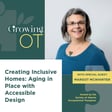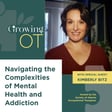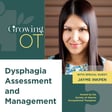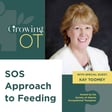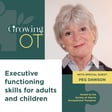
Unveiling the Power of Interoception with Kelly Mahler
Welcome to another episode of Growing OT! Today, we have an incredibly insightful guest, Kelly Mahler, joining us to delve into the fascinating world of interoception. In this episode, we're going to uncover the journey of interoception, unlocking its immense power, and navigating the intricate assessment puzzle.
We'll also explore the importance of language in bridging the gap between occupational therapy and interoception, and discover how interoception is the foundation of self-regulation. Kelly will share her expertise on empowering families to embark on this interoceptive journey and how to nurture awareness through fun daily routines.
You won't want to miss this episode! Stick around as we wrap up with some delightful and creative expressions clients have used to describe their sensations during interoception exercises.
